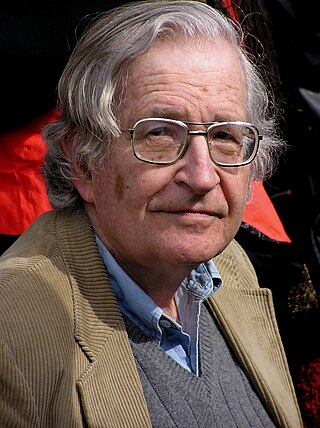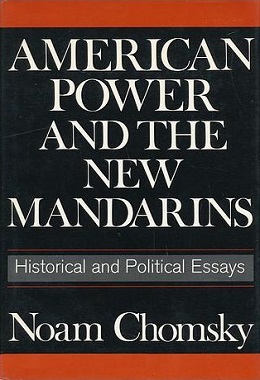Related Research Articles

Avram Noam Chomsky is an American professor and public intellectual known for his work in linguistics, political activism, and social criticism. Sometimes called "the father of modern linguistics", Chomsky is also a major figure in analytic philosophy and one of the founders of the field of cognitive science. He is a laureate professor of linguistics at the University of Arizona and an institute professor emeritus at the Massachusetts Institute of Technology (MIT). Among the most cited living authors, Chomsky has written more than 150 books on topics such as linguistics, war, and politics. Ideologically, he aligns with anarcho-syndicalism and libertarian socialism.

An intellectual is a person who engages in critical thinking, research, and reflection about the reality of society, and who proposes solutions for its normative problems. Coming from the world of culture, either as a creator or as a mediator, the intellectual participates in politics, either to defend a concrete proposition or to denounce an injustice, usually by either rejecting, producing or extending an ideology, and by defending a system of values.

Hegemony or Survival: America's Quest for Global Dominance is a book about the United States and its foreign policy written by American political activist and linguist Noam Chomsky. It was first published in the United States in November 2003 by Metropolitan Books and then in the United Kingdom by Penguin Books.
Edward Samuel Herman was an American economist, media scholar and social critic. Herman is known for his media criticism, in particular the propaganda model hypothesis he developed with Noam Chomsky, a frequent co-writer. He held an appointment as Professor Emeritus of finance at the Wharton School of Business of the University of Pennsylvania. He also taught at Annenberg School for Communication at the University of Pennsylvania.
The Armies of the Night: History as a Novel/The Novel as History is a nonfiction novel recounting the October 1967 March on the Pentagon written by Norman Mailer and published by New American Library in 1968. It won the Pulitzer Prize for General Non-fiction and the National Book Award in category Arts and Letters. Mailer's unique rendition of the non-fiction novel was perhaps his most successful example of new journalism, and received the most critical attention. In Cold Blood (1965) by Truman Capote and Hell's Angels (1966) by Hunter S. Thompson had already been published, and three months later Tom Wolfe would contribute The Electric Kool-Aid Acid Test (1968).

Bernard B. Fall was a prominent war correspondent, historian, political scientist, and expert on Indochina during the 1950s and 1960s. Born in Austria, he moved with his family to France as a child after the Anschluss. He started fighting for the French Resistance at the age of 16 and later for the French Army during World War II.

Guenter Lewy is a German-born American author and political scientist who is a professor emeritus of political science at the University of Massachusetts Amherst. His works span several topics, but he is most often associated with his 1978 book on the Vietnam War, America in Vietnam, and several controversial works that deal with the applicability of the term genocide to various historical events, where Lewy denies both the Romani genocide and the Armenian genocide.
Dwight Macdonald was an American writer, editor, film critic, social critic, literary critic, philosopher, and activist. Macdonald was a member of the New York Intellectuals and editor of their leftist magazine Partisan Review for six years. He also contributed to other New York publications including Time, The New Yorker, The New York Review of Books, and Politics, a journal which he founded in 1944.

Noam Chomsky is an intellectual, political activist, and critic of the foreign policy of the United States and other governments. Noam Chomsky describes himself as an anarcho-syndicalist and libertarian socialist, and is considered to be a key intellectual figure within the left wing of politics of the United States.

The Anti-Chomsky Reader is a 2004 anthology book about the linguist and social critic Noam Chomsky edited by Peter Collier and David Horowitz. Its contributors criticize Chomsky's political and linguistic writings, claiming that he cherry-picks facts to fit his theories.

"Objectivity and Liberal Scholarship" is an essay by the American academic Noam Chomsky. It was first published as part of Chomsky's American Power and the New Mandarins. Parts of the essay were delivered as a lecture at New York University in March 1968, as part of Albert Schweitzer Lecture Series. The first third of the essay, "The Menace of Liberal Scholarship" by Noam Chomsky in The New York Review of Books, January 2, 1969, was taken "almost verbatim" from this essay.

American Power and the New Mandarins is a book by American academic Noam Chomsky. Largely written in 1968 and published in 1969, it was his first text focused on politics and sets out in detail his opposition to U.S. involvement in the Vietnam War.
Intellectual responsibility is a philosophical concept related to that of epistemic justification. According to Frederick F. Schmitt, "the conception of justified belief as epistemically responsible belief has been endorsed by a number of philosophers, including Roderick Chisholm (1977), Hilary Kornblith (1983), and Lorraine Code (1983)."
Counter-Revolutionary Violence: Bloodbaths in Fact & Propaganda is a 1973 book by Noam Chomsky and Edward S. Herman, with a preface by Richard A. Falk. It offers a critique of United States foreign policy in Indochina.
Politics, stylized as politics, was a journal founded and edited by Dwight Macdonald from 1944 to 1949.
This is a list of writings published by the American author Noam Chomsky.
Mitchell Goodman was an American writer, teacher, and activist. He is best known for his role in the Vietnam draft resistance movement, which drew the high-profile 1968 federal prosecution of the "Boston Five."

Cambodian genocide denial is the belief expressed by some Western academics that early claims of atrocities committed by the Khmer Rouge government (1975–1979) in Cambodia were much exaggerated. Many scholars of Cambodia and intellectuals opposed to the U.S. involvement in the Vietnam War denied or minimized reports of human rights abuses of the Khmer Rouge, characterizing contrary reports as "tales told by refugees" and U.S. propaganda. They viewed the assumption of power by the Communist Party of Kampuchea as a positive development for the people of Cambodia who had been severely impacted by the Vietnam War and the Cambodian Civil War. On the other side of the argument, anti-communists in the United States and elsewhere saw in the rule of the Khmer Rouge vindication of their belief that the victory of Communist governments in Southeast Asia would lead to a "bloodbath."
RESIST is a philanthropic non-profit organization based out of Boston, Massachusetts. It has provided grants to grassroots activist organizations around the country since its inception in 1967 as a result of the anti-war proclamation "A Call to Resist Illegitimate Authority".

Decoding Chomsky: Science and Revolutionary Politics is a 2016 book by the anthropologist Chris Knight on Noam Chomsky's approach to politics and science. Knight admires Chomsky's politics, but argues that his linguistic theories were influenced in damaging ways by his immersion since the early 1950s in an intellectual culture heavily dominated by US military priorities, an immersion deepened when he secured employment in a Pentagon-funded electronics laboratory in the Massachusetts Institute of Technology.
References
- ↑ Chomsky, Noam (23 February 1967). "The Responsibility of Intellectuals". The New York Review of Books . 8 (3). Retrieved 2009-09-03.
- ↑ Chomsky, Noam (23 February 1967). "The Responsibility of Intellectuals". The New York Review of Books. Retrieved 6 November 2023.
- 1 2 3 Jacoby, Russell (1989). "The Responsibility of Intellectuals?". Grand Street. 8 (4): 185–195. doi:10.2307/25007282. ISSN 0734-5496. JSTOR 25007282.
- ↑ Noam Chomsky's 'The Responsibility of Intellectuals', 50 Years On - Video of Conference at University College London.
- ↑ Allott, Nick; Knight, Chris; Smith, Neil (2019). The Responsibility of Intellectuals - Reflections by Noam Chomsky and Others after 50 years (PDF). London: UCL Press. ISBN 9781787355514.
- ↑ Mike Cushman, ‘UCL attack on Academic Freedom’, Free Speech on Israel; Matthew Reisz, Times Higher Education Supplement, 24 October 2019.